Emotional Overwhelm: How to manage it
Manage Anger, heal from Sadness and overcome Fear through the Five Elements
Emotional overwhelm is the feeling of being taken over by intense emotion that feels difficult to manage. When you experience emotional overwhelm, it can feel all-consuming. Can you think back to a time where you were uncontrollably angry, terribly afraid or unconsolably sad? Most of us will feel overwhelmed at some point in our lives.
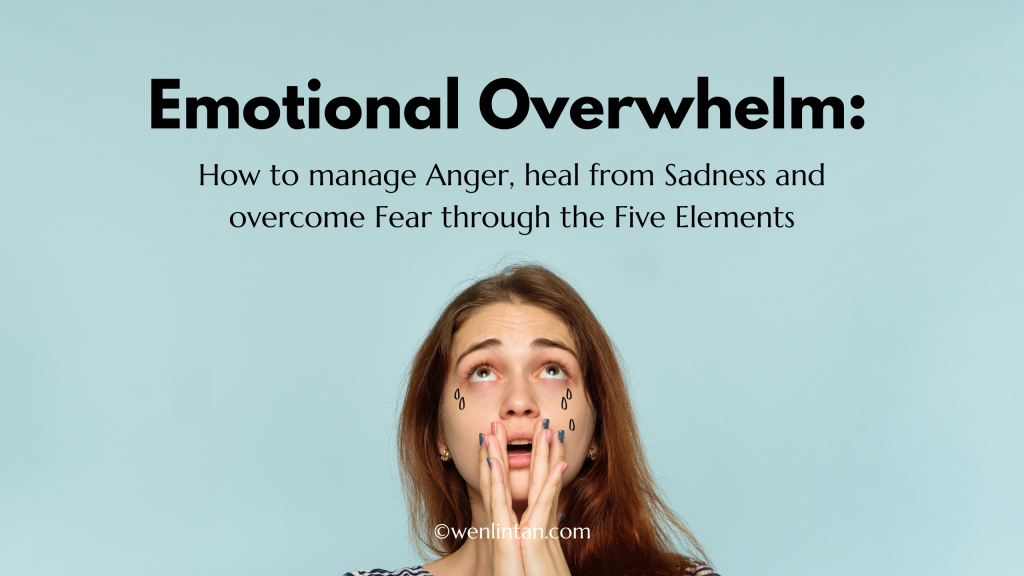
Emotional overwhelm can affect our ability to think and act rationally. It can even stop us from performing daily tasks. Some causes of emotional overwhelm include traumatic life experiences, stress, financial troubles, health problems and/or relationship issues. In this article you’ll explore why emotions are important, how emotions can help us live better lives, and learn a 4 step approach to help you overcome emotional overwhelm.

What are emotions? Why are they important?
But first, what is emotion? Emotion can be felt as the experience of energy moving through your body. Each emotion can be felt as different energetic qualities and bodily sensations, as reported in a 2014 study. Emotions influence many aspects of our lives. These include our thought process, decison-making and problem-solving, attention, learning and memory. Unsurprisingly, emotions influence even the quality and type of relationships we have with others
What about emotional overwhelm? How can it help us live better lives?
In modern society that prizes logic over emotions, it can be hard to acknowledge the importance of emotion. Some people see emotional displays as a sign of weakness. Others even criticize those who are seen as overly emotional. Even without external pressures, we may find we tend to avoid painful emotions because of our conditioning, and how intense they feel.
Many of us suppress, hide or ignore the emotional overwhelm we’re feeling, especially negative emotions like anger, fear or sadness. However anger, fear and sadness are particularly important because they tell us something about our underlying beliefs, attachments, desires, hard-wired responses and expectations of the world. A 2021 research review found that emotions are a way humans evolved to address problems in a constantly changing world.
While no one wants to be sad, afraid or angry, they can help us better understand our tendencies and how we can navigate this world. Understanding and attuning to your emotions can transform your relationships. It can improve how you relate to the world and help you grow, learn, and ultimately survive. Now that we’ve understood why emotions are important, let’s explore a 4 step approach to overcome emotional overwhelm.
4 Steps to overcoming emotional overwhelm
1. Save energy by feeling your emotions instead of fighting them
First, it takes no effort to feel sad when you feel sad, or to feel angry when you feel angry. Yet, often we expend much energy resisting or trying to dissociate from feelings of emotional overwhelm. For example, you may notice that when you start to feel slightly guilty, you may resist feeling guilty, or blame yourself for feeling guilty, since you believe you should not feel guilty.

To facilitate healing it is necessary to experience the emotions that go with our stories, and those are located in the body, says psychotherapist Dr. Hilary Hendel. When you allow your emotions to be felt, the energy of each emotion can move and flow. This regulates your Autonomic Nervous System, balances your stress hormones, and supports homeostasis and health. Furthermore, Zen master Thich Nhat Hanh says that ‘all emotions are impermanent and pass with time’. When you’re feeling low, remember that these feelings will come to pass, and by allowing yourself to feel them you’re allowing them to pass through you.
“We carry our attachments and pain in our bodies. As we let them go, our bodies change”
—Yung Pueblo
To live fully and to be the master of your emotions, let yourself feel angry when you feel angry, sad when you feel sad, afraid when you feel afraid, and so on. Don’t fight your feelings, feel them, let them flow through you.
2. Realize you feel emotional overwhelm. Your emotions aren’t you
Ever caught yourself saying, ‘I am depressed’, ‘I am frustrated’ or ‘I am guilty’? A common misbelief is that the emotion you’re feeling is who you are. To overcome emotional overwhelm, first, acknowledge you can’t be depressed, frustrated or guilty. None of these are your identity or permanent state of being. You are the one who feels them, experiences them.

Our experience of emotions is a result of attachment to specific desires and /or outcomes. Spiritual leader Ram Dass says that one way to get free ourselves of this attachment is to cultivate the witness consciousness, to become a neutral observer of your own life. The witness place inside you is simple awareness, the part of you that is aware of everything — just noticing, watching, not judging, just being present, being here now. This entails observing your thoughts, feelings, and emotions, without judging or criticizing, like a neutral spectator watching a documentary or a show.
How can I witness my feelings or emotions?, you might ask. Try these three practices:
PAST: Reflect on past challenging situations that caused emotional overwhelm
- Objectively reflect back on situations that have passed that were challenging to you. This can reveal your underlying beliefs and/or habitual responses within you that you might not be aware of.
- Try this physically through journaling, drawing, or verbally with yourself or a trusted confidant. Ask yourself, ‘How did I feel? What made me feel that way? And why? What outcome or desire was I feeling attached to?’ Do this only when you feel objective and are able to review and reflect on your past reactions without feeling self-critical or judgmental of yourself.
- Once you realise your habitual patterns and underlying beliefs, decide which no longer serve you, and let go of these so that you can start to change how you respond and feel in a similar situation in future.
PRESENT: Being mindful in the present
- Start by cultivating a routine mindfulness practice, which might be meditation. Within your mindfulness practice, let your intention be to take the seat of the observer.
- It is easier to start from gross (most obvious) to subtle. For example, in the beginning you might start by observing the tangible physical aspects of your experience e.g. weight of your body, points of contact of your body with the chair or ground beneath you, or the rise and fall of your breath. Shift to observe your thoughts, and gradually, with time, observe deeper layers of feelings and emotions.
- Continue this practice of observation in daily life, especially outside of formal meditation / mindfulness practice.
FUTURE: Rehearse / prepare to prevent emotional overwhelm in the future
- In the same way that we can learn about ourselves from the past, you can be better prepared for the future if you rehearse and set intentions for how you would like to feel and respond to the world in future.
- Try asking yourself, hypothetically, if this challenging situation which made me feel emotional overwhelm were to happen in the future e.g. next week, how would I like to respond this time? How would I like to feel? What resources might I need to better prepare myself mentally, physically and emotionally?
- Set an intention for how you’d like to feel for the future. For example, you might try picking one of these 110 affirmations, or write your own affirmation and repeat it to yourself before you start the day, to let that set the tone and energy of the coming day.
3. Manage complex emotions from emotional overwhelm by simplifying them
Moving from ‘I am depressed’ / ‘I am frustrated’ / ‘I am guilty’ to ‘I feel depressed’, or ‘I feel frustrated’ or ‘I feel guilty’ can help, but even then, each of these still feels heavy and overwhelming. Depression, guilt and frustration are all complex intellectual concepts, which are impossible to feel. An important insight from the Five Element framework from traditional Chinese medicine (TCM) and Daoist philosophy is that there are only five primary emotions. These are called the 五志 in The TCM Classic, the Yellow Emperor’s Inner Cannon 黄帝内经 Huangdi Neijing – Fear, Anger, Excitation, Worry and Grief.
人有五脏化五气,以生喜怒悲忧恐。 《素问·阴阳应象大论篇》
Man has the five organs (and meridian channels); they transform the five qi, thereby generating Excitation/Joy, Anger, Grief/Sadness, Worry, and Fear. — Discourse on the Correspondences of Yin-Yang, Chapter 5, Yellow Emperor’s Inner Cannon

These Five Elements, / Five moving forces WuXing 五行 are Water, Wood, Fire, Earth and Metal. They are forces, phases, transitions, transformations and energetic qualities, that manifest and drive all phenomena. These shifting energies manifest in the form of emotions, cardinal directions, seasons and so on. Here you can view the full Five Element relationship table. Any complex emotion can be simplified to a primary emotion associated with one of these Five Elements – for example:
- Underneath depression is Grief / Sadness, which could come from regret, loss or not feeling valued or worthy.
- Behind frustration lies Anger, from a mismatch between your expectations and reality.
- The root of guilt, insecurity and /or nervousness is Fear, fear of retribution, death, or loss of something or someone.
Follow this insight and the design principle KISS – Keep it Simple Silly, to simplify the emotional overwhelm. The next time you experience emotional overwhelm, simplify what you’re feeling to a primary emotion. This will make it feel much more manageable, because everyone experiences sadness, anger and fear, and these are much easier to manage than complex intellectual notions like depression, frustration and guilt.
4. Manage each emotion through the Mothering emotion and Controlling emotion
This is the last and most powerful step of this four step approach. The most crucial key to overcoming emotional overwhelm and emotional mastery lies in the two relationships that connect the five primary emotions with each other. The first is the Sheng 生 or Generation Cycle, where one emotion births or gives rise to another.
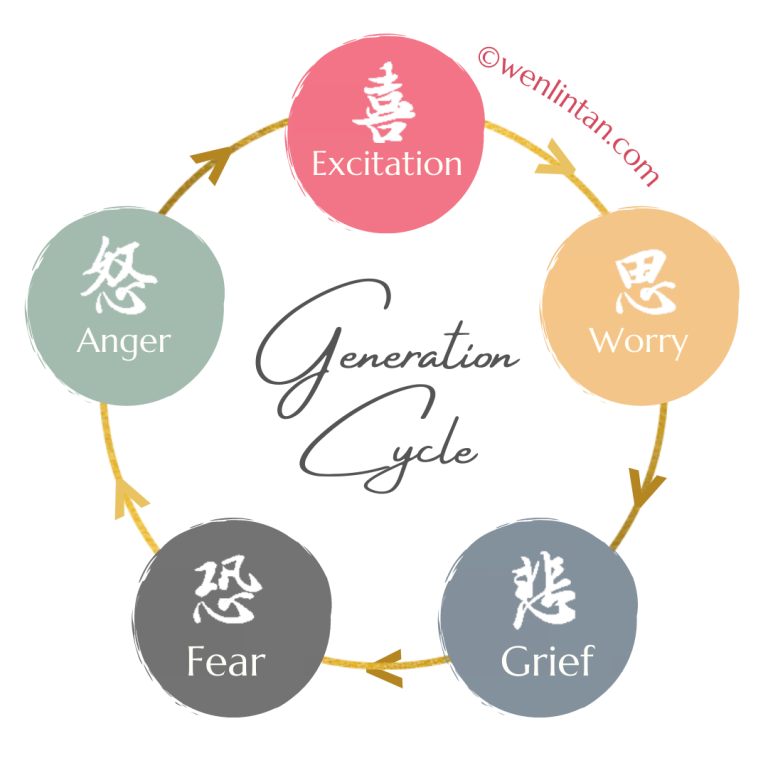
From the generation cycle above you can see that:
- Fear births Anger
- Anger births Excitation / Joy
- Excitation / Joy births Worry
- Worry births Grief / Sadness
- Sadness births Fear
Second is the Ke 克 or Regulating Cycle, where one emotion regulates, controls or manages another.
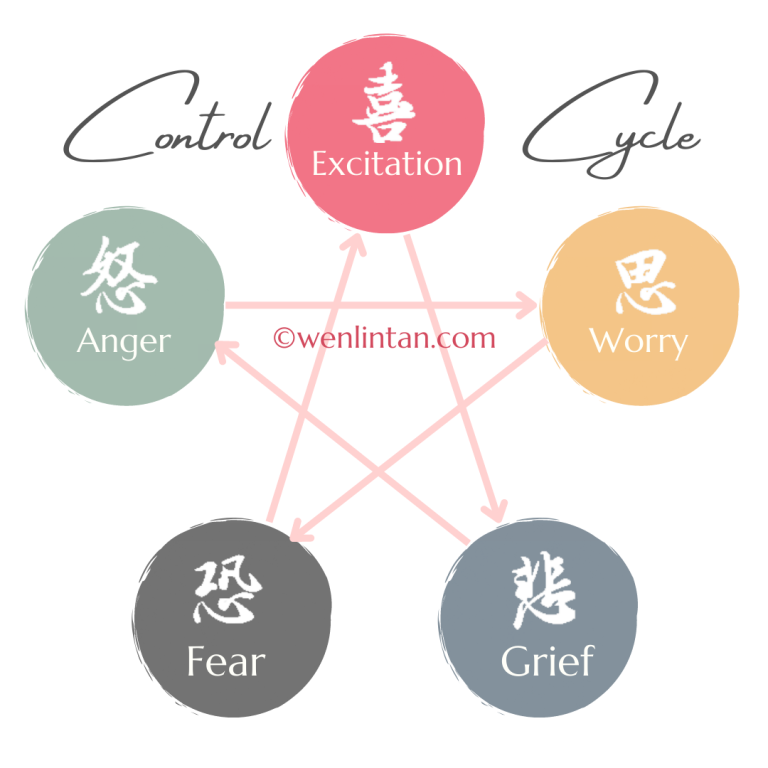
In the control cycle it can be observed that:
- Anger is controlled by Grief,
- Grief is controlled by Excitation
- Excitation is controlled by Fear
- Fear is controlled by Worry, and
- Worry is controlled by Anger.
Each primary emotion births an emotion, and is regulated by another emotion. The antidote to the emotion you are prone being overwhelmed by to lies in the emotion that generated it, and the emotion it is controlled by. Let’s look at 3 examples: Anger, Sadness/Grief and Fear and how to overcome emotional overwhelm in these 3 cases.
Overwhelm from Anger: Transform Anger with Compassion
Anger is mothered by fear and controlled by grief (see image below), and often manifests as feelings of annoyance, irritability, impatience, rage or resentment. Anger is also associated with the Wood Element, Spring season and the liver and gallbladder organs and meridian channels. When balanced, the Wood Element manifests in the form of motivation, decisiveness, agency and action.
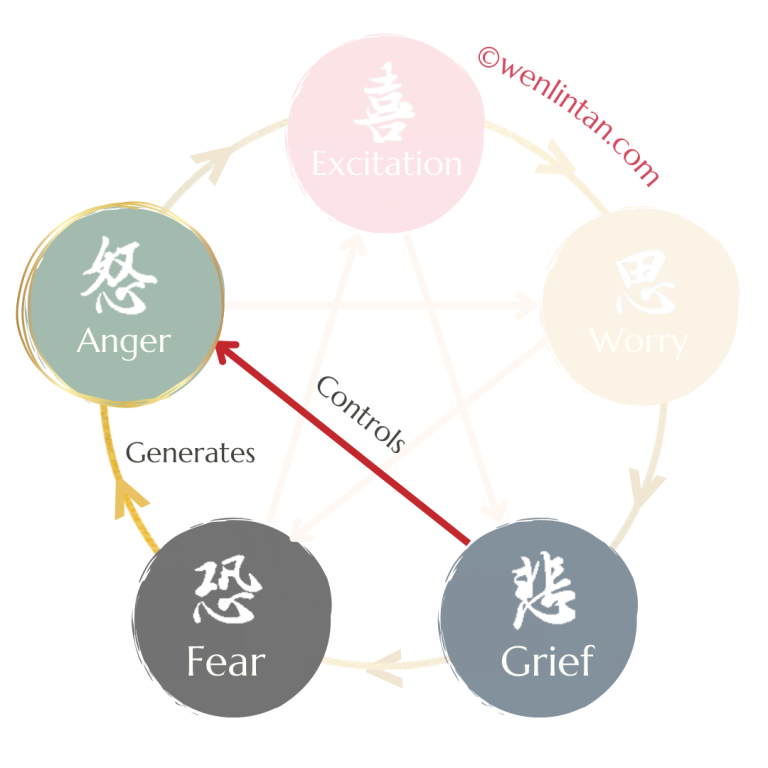
❓ If you feel angry, irritable or annoyed about something and/or someone, pause and ask yourself,
- What am I afraid of?
- What am I sad about?
The root of anger is often associated with loss of time, control, resources, unfairness or an outcome going differently from expected due to external or internal factors. For example, I might be angry at my dog for peeing on my Yoga mat despite telling him multiple times that it is not the right behaviour and that he should pee outdoors on the grass. In this case, I am afraid he doesn’t understand me, and sad that if this happens again the Yoga mat will get ruined.
Another example – if someone cut my queue after I waited 30 minutes in line, I might be incredibly angry. And beneath that anger might be a feeling of sadness of having my ‘rights’ violated and wasting thirty minutes waiting in the queue, or the fear of possibly being reprimanded for arriving late at work later by my boss. As you find the cause of the anger, the emotion will dissipate.
3 Antidotes to dissolve and manage Anger:
If you’re prone to emotional overwhelm relating to anger, try these:
- Count to 100: Count from 0 to 100 when you’re furious to diffuse your anger in the moment. This simple yet effective technique gives you a chance to gather yourself and your thoughts before you respond.
- Identify triggers for your anger. What do you tend to feel frustrated, annoyed or irritated about? How might you change your expectations about life situations so you respond in a different way?
- Root yourself in compassion / kindness. A mindfulness practice rooted in loving-kindness and compassion for yourself and others can be a potent antidote for dissolving anger. The short teaching below from Yongey Mingyur Rinpoche – a Tibetan lama and best-selling author of The Joy of Living – teaches how we can use meditation to discover our basic goodness and transform anger into loving-kindness.
Other resources that may be helpful: Mayo Clinic’s Anger management guide and Healthline’s guide to controlling anger.
Overwhelm from Grief: Heal Grief with Gentleness & Acceptance
Sadness, or Grief is feeling often accompanied by loss of something and/or someone precious. It is mothered by Worry, and controlled by Excitation (see image below). Sadness is also associated with the Metal element, Autumn season and the lungs and large intestine organs and meridian channels. The Metal element is associated with the corporeal soul and your ability to take in and to let go. When in balance, one is optimistic and fully present in every moment.
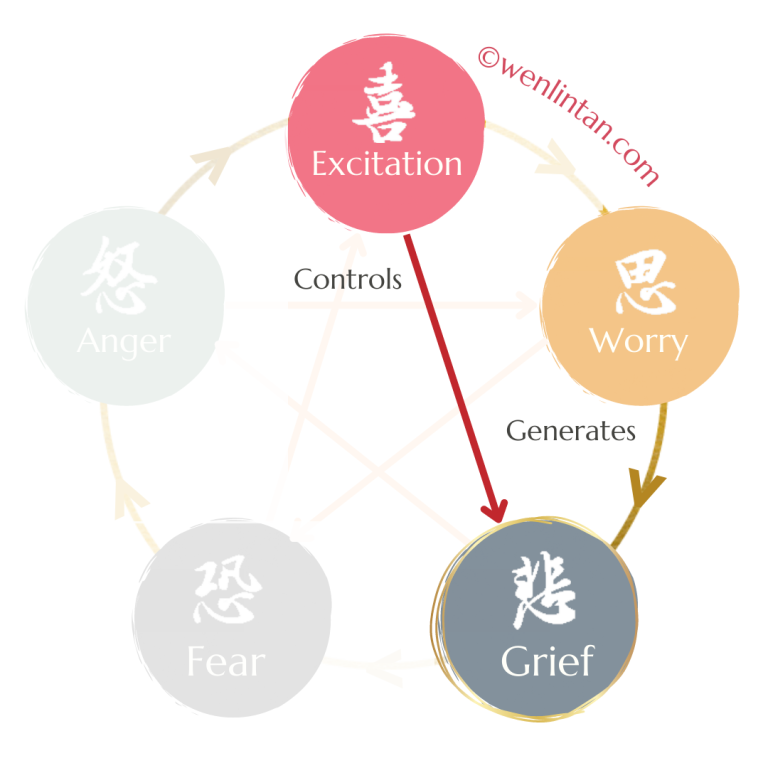
❓If you feel sad, If ask yourself:
- What was I excited, joyful for that is no longer here?
- What am I worried about? What have I lost?
For example you might feel sad because you missed the joyful feeling of being with your family member, but can no longer feel that because he/she/they have passed away due to disease. You might also feel worried that it might happen to someone else you love. Aside from bereavement, there are other types of loss such as the end of a relationship e.g. divorce or breakup, or losing a job, deterioration in health, a miscarriage or losing your home.
Sadness / grief can sometimes manifest in various forms, including shock and/or numbness, overwhelming sadness, with lots of crying and tiredness or exhaustion. It could even surface as guilt out of regret of not being able to undo what has happened.
5 Approaches / tools to heal from Grief/Sadness:
If you’re struggling emotional overwhelm from grief, try these:
1. Acknowledge your pain, and accept it could trigger different emotions. Identify triggers for your sadness / grief. Is it because of the passing of a loved one, relationship issues, personal loss, stress or something else? Notice the fluctuation of your moods
2. Understand where you are: Reference Kubler-Ross Model of Five Stages of Grief to explore where you might be on your pathway to healing. These are five stages: denial, anger, bargaining, depression, acceptance. Rather steps or stages, these are non-linear. Remember that your grieving process is unique to you. (Image below from Speaking Grief)
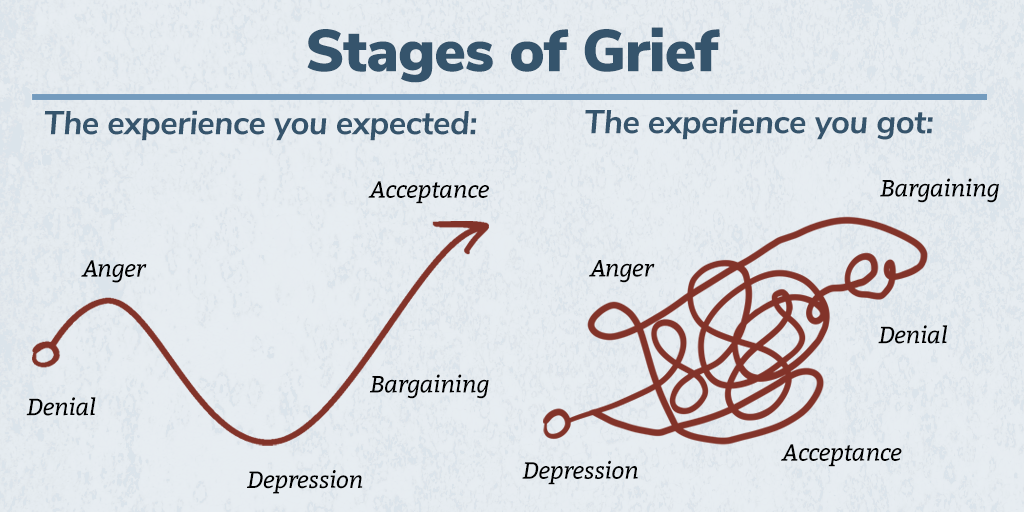
3. Seek activities and the company of others who comfort and heal you. This can disrupt the lethargy that often accompanies the sadness. This could be reaching out to a friends, seeking out a support group or spending time with a trusted therapist.
4. Avoid unhealthy coping mechanisms. These include alcohol or junk food binging, binge shopping or taking drugs. Though they make make you feel better in the short run these only temporarily numb you from the sadness.
5. Be gentle with yourself. Carve out time for naps, eat nourishing foods, and drink plenty of water. Notice if negative self-talk arises, and when it does, let your inner critic know gently and kindly that this is not the place for them.
If you’re unsure if you’re experiencing sadness/grief or depression, consult a therapist.
Overwhelm from Fear: Transform Fear through Safety and Presence
Fear is mothered by Sadness, and controlled by Worry (see image below). Fear is also associated with the Water element, Winter season and the kidney and urinary bladder organs and meridian channels. The Water Element is the source of life-force and will. When in balance, it manifest in the form of strong willpower and endurance. When imbalanced it manifests as fear, which may inhibit growth e.g. fear of making decisions, moving forward.
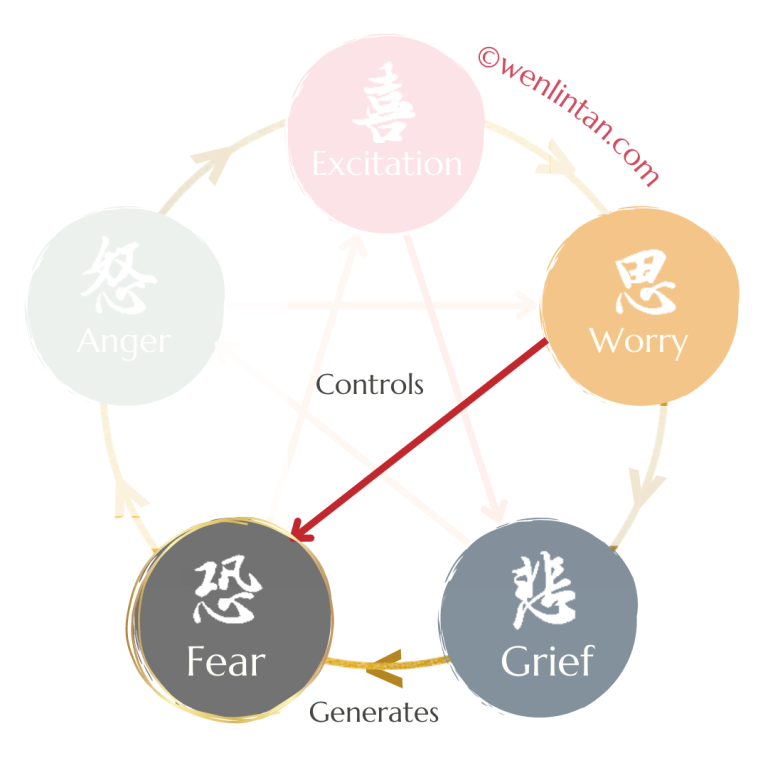
❓If you feel fearful or afraid, ask yourself:
- What do I feel sad about? What have I lost?’
- What is worrying me?’ What could happen
For example, I might be fearful because I feel that sad as a child I lost a loved one to cancer, and I worry that the same disease might rob me of my life. Or, I might be afraid that next week I can’t pay the rent and will lose my home because I struggled to make ends meet during the pandemic.
The key to overcome fear is to build trust. But trust can only be build upon the foundation of safety – creating a feeling, an environment and belief that you are safe and nothing bad is happening to you, at least in this exact moment.
5 Approaches / tools to dissolve Fear:
If you’re struggling emotional overwhelm from fear, try these:
1. Root in Safety:
Fear often arises from the belief that something bad could happen in the future. To dissolve fear, create safety for yourself and ground yourself in the present moment. Remember that in this moment, you are safe, you are held, you are loved. Remembering this truth, this fact will help to alleviate the emotional overwhelm you feel from fear. Ground through the root chakra visualisation and meditation here.
2. Stay present through tapping / breathing:
Fear comes from ‘What-ifs’. To counter this fear, stay present. There are many ways of staying present in your physical experience. Some of the best ways of staying present include tapping, focusing on your breath or moving meditations like Qigong or Yoga (try the videos here) which engage you in your physical experience, preventing ‘what-if’s from arising in your mind. Try this simple but helpful 5 minutes tapping with affirmations to soothe anxiety and fear.
3. Ask yourself, is it true?
At times it can be helpful to challenge fearful thoughts. For example, if you’re scared of not being make ends meet next month, ask yourself, is this true? How am I doing now? Ask yourself what you would say to a friend who had a similar fear.
4. Get support from others
Connect with and get help from others who have experienced similar fears and overcome them. Through them you can find encouragement, inspiration, support and ideas for how you might overcome your own fear and turn it into your fuel.
5. Take small steps out of your comfort zone
Taking big strides can be scary. Overcome your fear by taking small steps to confront it. Each time you move closer to confronting your fear, notice that you are safe, you are well. Keep going. Remember that fear is there to help you, but it is also holding you back from your full potential. What if you were fearless? What would that feel like? Meditate on these questions.
Other resources to overcome emotional overwhelm from fear: NHS 10 ways to fight fears | Mental Health UK Overcome Fear
For over a decade I have been researching how to control anger, heal from sadness and overcome fear to feel at peace. Through aligning with the Law of the Five Elements and how they relate to emotions, I have been able to help my clients and myself cultivate calm and peace. I hope this method can help you do the same. When was the last time you felt overwhelmed?
Did you try the four step approach to overcome emotional overwhelm? How did it go for you?
I’d love to hear from you. Leave a comment below or email me 🙂
This Post Has One Comment
Leave a Reply
You must be logged in to post a comment.

[…] Star breathing exercise can positively impact emotional well-being. You shift your emotional state by visualizing the radiant star and connecting it with its calming […]